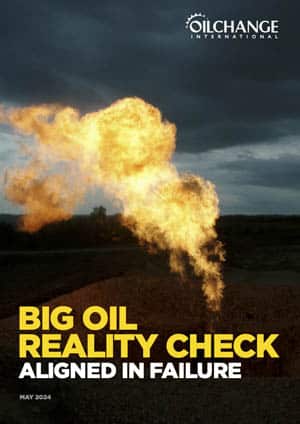[Oil Change International] Big oil and gas companies’ climate pledges and plans are dangerously inadequate, and put the world on a path to climate chaos and widespread harm to communities. The case for keeping oil, gas, and coal in the ground has never been stronger, but big oil and gas companies continue to resist and block a fast and fair transition to clean, renewable energy.
Oil Change International’s Big Oil Reality Check report assesses the climate pledges and plans of eight international oil and gas companies – Chevron, ExxonMobil, Shell, TotalEnergies, BP, Eni, Equinor, and ConocoPhillips – against 10 criteria representing the bare minimum for aligning with the Paris Agreement to limit global heating below 1.5°C.
Key Findings:
The Big Oil Reality Check report finds that these oil majors fail to align with international agreements to phase out fossil fuels and to limit global temperature rise to 1.5ºC. Every company is “Grossly Insufficient” or “Insufficient” on a majority of criteria. and three of them (Chevron, ConocoPhillips, and ExxonMobil) are “Grossly Insufficient” – the lowest rating – on all criteria.
Combined, these 8 companies’ current oil and gas extraction plans are consistent with more than 2.4°C of global temperature rise,(1) likely leading to global devastation. These companies alone are on track to use 30% of our remaining carbon budget to limit global temperature rise to 1.5°C.
Of the 8 analyzed companies, 6 have explicit goals to increase oil and gas production. Even those without such plans are advancing new fossil fuel projects and selling polluting assets rather than shutting them down, masking their actions as contributing to an energy transition while perpetuating climate pollution.
None of the 8 companies have set comprehensive targets to ensure their total emissions decline rapidly and consistently, starting now. Every company intends to rely on carbon capture and storage (CCS), offsets, and/or other methods that delay and distract from ending fossil fuels, and prolong the health and community safety impacts of dirty energy.
All of the companies fail to meet basic criteria for just transition plans for workers and communities where they operate. All of them fail to meet basic criteria on upholding human rights.
While last year the world committed to “transition away from fossil fuels” at the United Nations Climate Change Conference, the report reveals that oil and gas companies are moving in the opposite direction, by doubling down on drilling that unleashes damage to our climate and fuel disasters by poisoning us, our air, land, and water.
If oil and gas companies were serious about the climate crisis, the first way they’d show it would be ceasing to add new fuel to the fire – meaning no new exploration, expansion, or production of fossil fuels. Instead, 6 of the 8 companies (Chevron, ExxonMobil, TotalEnergies, ConocoPhillips, Equinor, and Eni) have explicit goals to increase oil and gas production.
Even those companies (BP and Shell) that don’t have explicit plans to increase total production are putting forward new fossil fuel projects for approval, while framing themselves as contributing to the energy transition with a different strategy: selling polluting assets to other companies who will almost certainly make sure those fossil fuels are burned. Selling polluting assets can make it look like BP and Shell are heading in a better direction, but unless oil and gas fields are retired, the reality is this strategy protects their bottom lines while climate pollution continues.
The Big Oil Reality Check report reveals that none of the companies we analyzed have set comprehensive targets to ensure their total emissions decline rapidly and consistently, starting now. Instead of phasing out production as rapidly as possible, every company intends to rely on carbon capture and storage (CCS), offsets, and/or other methods that delay and distract from ending fossil fuels, and prolong the health and community safety impacts of dirty energy. All are lobbying against climate action, greenwashing, and otherwise maneuvering to undermine the energy transition.
While many companies have co-opted the language of ‘just transition’ from labor and climate justice movements in recent years, all the companies fail to meet basic criteria for just transition plans for workers and communities where they operate. Five companies score “Grossly Insufficient” and three score “Insufficient.”
On upholding human rights, five score “Grossly Insufficient” and three score “Insufficient”. These companies’ track record when it comes to protecting human rights and Indigenous Peoples’ rights is deeply concerning. Each is experiencing resistance from frontline communities to their projects based on human rights, health, and/or safety concerns.
An Oil Change International investigation in March 2024 revealed that ExxonMobil, Chevron, TotalEnergies, BP, Shell, and Eni are all complicit in facilitating the supply of crude oil to Israel. This is in the context of the Israeli military’s ongoing massacre of Palestinians in Gaza and mounting evidence of war crimes. Human rights are non-negotiable and these companies’ apparent disregard for it is yet another reason they should not be trusted to take climate action.




